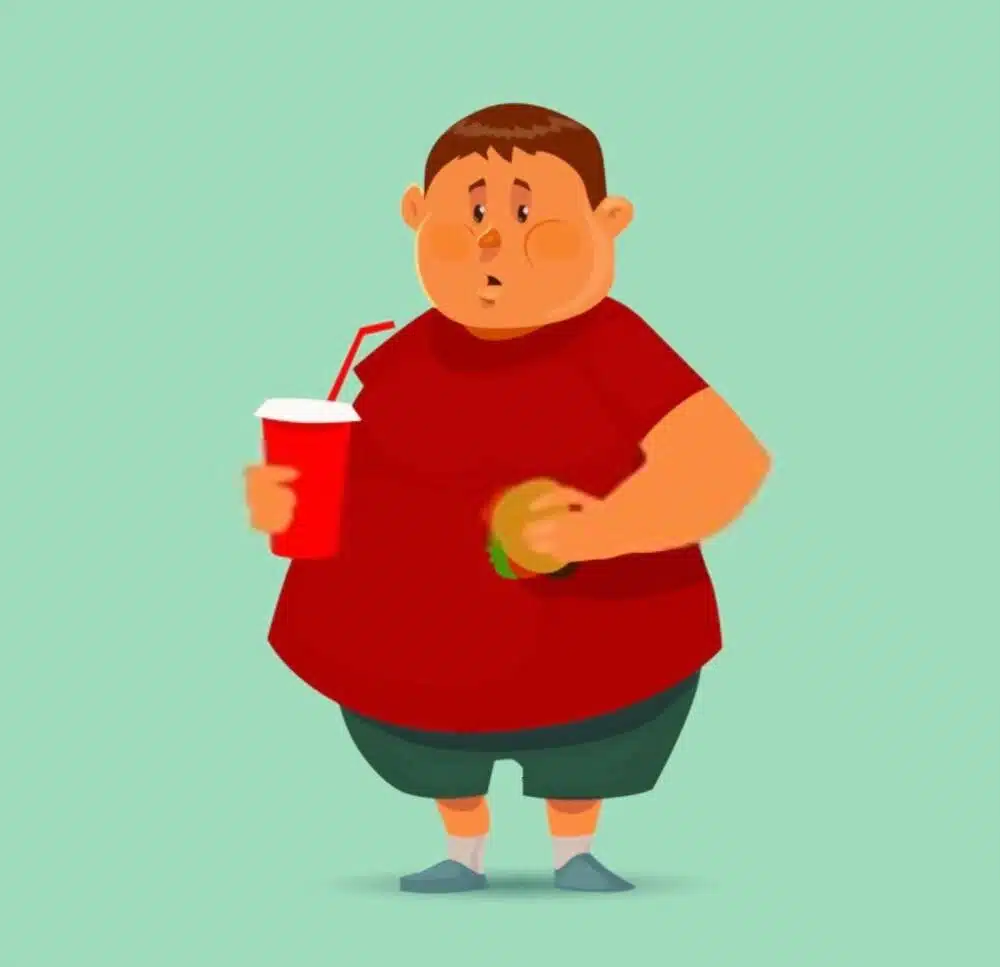
Essay on Causes of Obesity – Obesity can be caused by several different factors, including genetics and diet. Plenty of people are trying to combat obesity using exercise and diet control, but for some the only solution may be weight loss surgery or medication. Let’s dive deeper-
Childhood Obesity Meaning

Childhood obesity is a problem that is growing more and more common. Obesity in children can have serious health consequences, including an increased risk of diabetes, heart disease, and some types of cancer. There are many causes of childhood obesity, but there is no one answer to solving the problem.
However, there are things that parents can do to help their children avoid becoming obese and to improve their chances of having a healthy future.
One important thing that parents can do is to make sure their children eat nutritious foods. Children who eat a balanced diet full of fruits and vegetables are likely to be less likely to become obese than children who don’t eat enough fruits and vegetables. Parents can also help their children stay active by encouraging them to play outside and get exercise. Exercise not only helps children stay healthy, it also helps them feel good about themselves. When children feel good about themselves, they are more likely to be successful in life.
10 Causes for Childhood Obesity
1. Lack of physical activity: Too much sitting time and not enough movement can lead to obesity in children.
2. Calorie-rich foods and drinks: Children are often tempted to eat high-calorie foods and drinks when they are around them.
3. Poor nutrition: Poor food choices can lead to obesity in children.
4. Genetics: Some children are more likely to become obese than others, regardless of their diet or exercise habits.
5. Exposure to television and screen time: Too much screen time (including watching TV, playing video games, using electronic devices) can contribute to obesity in children.
6. Environmental factors: Children who live in unhealthy environments, such as areas with poor air quality or lots of pollution, are more likely to become obese.
7. Cultural influences: Children growing up in families that have a high prevalence of obesity are more likely to become obese themselves.
8. Stress: Chronic stress can lead to weight gain and obesity in children.
9. Traumatic experiences: Experiencing traumatic events, such as abuse or neglect, can increase the risk of childhood obesity.
10. Sleep habits: A lack of sleep is linked with weight gain and obesity in children
Essay on Causes of Obesity
What is Obesity
Obesity is a condition in which excess body fat has developed to such an extent that it may be harmful or interfere with normal functioning. Obesity can be caused by many factors, including diet, lack of exercise, and genetic disposition.
There are two types of obesity: primary and secondary–
Primary obesity is when the body’s total body weight is above a certain threshold, while secondary obesity is when the body’s weight becomes excessive but doesn’t meet the primary obesity definition. The most common sign of obesity is being overweight or obese. The BMI (body mass index) score is used to measure overweight and obesity.
A BMI over 25 indicates overweight, and a BMI over 30 indicates obese. There are also other measures that can be used to determine if someone is obese, such as waist-to-hip ratio and waist-to-height ratio.
Obesity can lead to a number of health problems, including heart disease, type 2 diabetes, stroke, arthritis, and some forms of cancer. It can also lead to poor mental health and decreased life expectancy.
What are the Causes of Obesity?

Obesity is an epidemic in the world. It’s a problem that is preventing people from enjoying their lives to the fullest and affecting their health in many ways. In this article, we are going to explore some of the causes of obesity.
Genetics– There are several genes that play a role in obesity development. One gene called leptin, which codes for a protein that helps control energy intake and metabolism, has been found to be associated with obesity. People who have two copies of the leptin gene are more likely to develop obesity than people who have one copy of the gene.
Lifestyle Factors– Lifestyle factors also play a role in obesity development. Eating too much and not exercising can both contribute to obesity. Eating too much unhealthy food can make you obese because it contains high amounts of calories and saturated fat. Not getting enough exercise can also make you obese because it causes your body to store more fat.
Food Addiction– There are many possible causes of obesity, and each person’s body is unique. Genetics may play a role in how easily someone becomes obese.
Other factors that can contribute to obesity include:
eating too much or too little food; lack of exercise; excess sugar and sweetener intake; stress; and environmental factors, such as availability of unhealthy foods.
Obesity can be a serious health problem if it’s not treated properly. Obesity can lead to heart disease, stroke, type 2 diabetes, and some forms of cancer. It can also cause chronic pain and arthritis. In the US, more than one-third of adults are considered obese (BMI greater than 30).
Obesity rates vary greatly by country, with approximately one-fifth of Japanese people being obese and more than 60% of Native Americans being obese.
Environmental Toxins
The world is getting more and more obese. One of the leading causes may be the increase in environmental toxins.
According to a new study, it’s also influenced by environmental toxins. Researchers from the University of Illinois at Chicago found that obesity is related to exposure to chemicals that can cause birth defects or other reproductive problems.
The study was conducted over a period of 10 years and looked at data from participants in the National Health and Nutrition Examination Survey (NHANES). They found that those who had the highest levels of chemicals in their blood were twice as likely to become obese as those with the lowest levels.
Some of these chemicals include polychlorinated biphenyls (PCBs), dioxins, and organochlorine pesticides (OCPs). All three of these groups have been linked to health problems such as cancer and reproductive problems. PCBs are especially dangerous because they don’t break down easily and can accumulate over time in the environment.
Although this study only looked at obesity, researchers say that it’s likely that other health problems are also related to these environmental toxins.
Effect of the Obesity

The effects of obesity can be wide-ranging and complex. They can include problems with breathing, heart disease, type II diabetes, some types of cancer, arthritis and other joint problems, and reproductive problems. Obesity also increases the risk of developing other health problems. More than one third of adults are obese, and obesity rates have increased dramatically in recent decades.
The number of people who are obese has more than doubled since 1980, and the number of people who are so fat that they have a medical condition called obesity-related illness (ORI) has tripled.
The main cause of obesity is overeating and drinking too much alcohol. However, genetics also play a role in when someone becomes obese and how severely their weight affects their health. If you are obese, you are at risk for many health problems.
Remedies to Cure Obesity-
The first step is to accept that you have a problem and that you need to change your lifestyle. There are many natural remedies that can help you lose weight and cure obesity. Here are some of the most effective ones:
1. Drink plenty of water: Water is essential for proper hydration and cell function. It also helps fill you up so you eat less throughout the day. Aim to drink at least 8 glasses of water per day to stay properly hydrated and help with weight loss.
2. Avoid processed foods: Processed foods are high in calories and low in nutrients. They also tend to be very addictive, which can make it difficult to stick to a healthy diet. Instead, focus on eating whole, unprocessed foods that are packed with nutrients. These include fresh fruits and vegetables, whole grains, lean proteins, and healthy fats.
3. Get more sleep: Sleep is one of the most important factors in weight loss and overall health. Lack of sleep can lead to weight gain, as it increases levels of hunger hormones and makes you crave unhealthy foods. Getting enough sleep (around 7-8 hours per night) can help you lose weight and keep it off for good.
4. Eat more protein: Protein is an essential nutrient for weight loss and muscle building. It helps you feel fuller for longer, reduces cravings, and helps maintain a healthy metabolism. Make sure to include plenty of protein-rich foods in your diet, such as lean meats, eggs, fish, legumes, and dairy products.
5. Cut out all junk food and empty calories from your diet. Replace them with healthy, whole foods.
6. Get active! Start by simply walking more often. then work your way up to more strenuous exercise as you lose weight and get in better shape.
7. Find a support group or online community to help you stay on track and motivated.
8. Finally, don’t give up! Making lasting changes can be difficult, but it’s worth it for your health and happiness.
Conclusion
Obesity is a very complex issue that can have many different causes. In this article, we have discussed some of the more common causes of obesity. By understanding these causes, you can start to make changes towards preventing or reducing your risk of becoming overweight.
People Also Ask :
1.What are the Causes for Obesity
or
What is the Causes of Obesity
Ans : Obesity is caused by a combination of genes, environment and lifestyle.
2.What is an obesity short essay?
Ans : Obesity is a condition in which excess body fat has developed to the point where it may be harmful to one’s health. It can lead to serious health conditions such as heart disease, stroke, type 2 diabetes, and some types of cancer.
3.Why obesity is a problem?
Ans :Obesity is a problem because it can lead to health problems such as type 2 diabetes, heart disease, and some forms of cancer. Obesity also causes discomfort in personal lives and at work. It is a major global problem that needs to be addressed.
4.How can we prevent obesity?
Ans :We can prevent obesity by eating a balanced diet, exercising regularly, and not smoking.
5.Who suffers from obesity?
Ans : Everyone does, obesity is a global problem. Obesity increases the risk for many diseases and affects every person in some way. Statistically speaking, more people suffer from obesity than from any other chronic disease.